Risk
The CALP Network’s State of the World’s Cash report found that the perception that CVA is riskier than other forms of aid was one of the main barriers to CVA being routinely used. This concern is linked to the growing emphasis from donors on anti-terrorism and money laundering, and shrinking budgets for humanitarian assistance. The CALP Network’s work under this theme aims to debunk myths, facilitate collaboration, and share learning to ensure that CVA is systematically and equally considered, based on evidence of actual risks across modalities.
Current priorities
A variety of organisations are currently working on CVA and risk. The CALP Network is working to identify synergies among actors, avoid duplication, and define joint priorities that can be better addressed collectively. Together with WFP, the CALP Network is co-leading the risk priority within the Grand Bargain workstream on cash.
Featured content
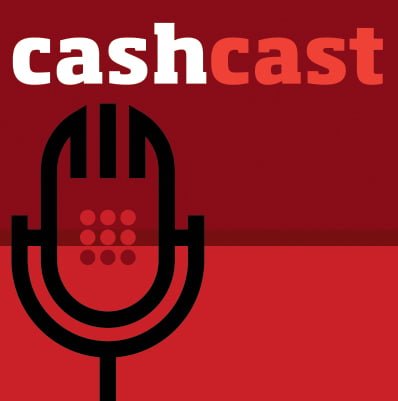
Podcast: Will risk aversion hold us back from realizing the potential of CVA?
Podcast
Episode 1 of the CashCast, exploring how attitudes to risk have impacted the use of CVA in the Middle East and North Africa region.

CVA and Risks: What happens in the field, stays in the field?
Blog Post
In October 2019 in Douala, Cameroon, the CALP Network facilitated a learning event exploring the risks to beneficiary protection in Cash and Voucher Assistance (CVA). This closed-door workshop, held as part of series of meetings and webinars on theme of CVA and risk in different regions, convened 25 humanitarian workers from West and Central Africa representing local and international NGOs, UN...

Webinar: Data sharing in CVA: ethics, ownership and privacy
Event
Thematic lead
Latest

Harmonising registrations and identification in emergencies in Somalia
Report
The study reveals that the collection of registration and identification data in Somalia is governed mainly by policies, guidelines and standard operating procedures developed by humanitarian agencies. Before collecting registration data, most humanitarian agencies select recipients through a two-step...

Mitigating Risks of Abuse of Power in Cash Assistance in Iraq
Report
This document outlines lessons learned from a joint UNHCR/WFP project in Iraq aimed at identifying and mitigating the risks of abuse of power in cash assistance. The cash transfer mechanisms reviewed during the
project include mobile money, e-vouchers and cash delivered through money transfer agents.

Harmonising registrations and identification in emergencies in Somalia – Briefing
Report
This briefing highlights the benefits, risks and challenges associated with establishing an integrated data system for cash transfer programming (CTP), based on the findings of a study that examined how different humanitarian agencies in Somalia are managing the collection, analysis and sharing of...
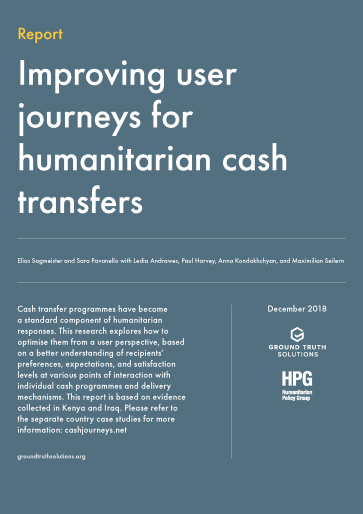
Improving user journeys for humanitarian cash transfers
Report
Humanitarian agencies are increasingly using digital payments, such as mobile money, pre-paid or smartcards, bank cards and electronic vouchers, to deliver cash assistance to affected populations. At the same time, the analysis and use of payment technologies have become more important, as have...

Mitigating Risks of Abuse of Power in Cash Assistance – Workshop Nairobi, Kenya
Report
UNHCR and WFP are implementing a joint project to identify and mitigate risks of abuse of power by private sector service providers in the delivery
of cash assistance to vulnerable populations. The workshop, held in Nairobi on 10-11 December 2018, followed visits to the first two pilot countries,...

Mitigating Risks of Abuse of Power in Cash Assistance in Cameroon
Report
This document outlines lessons learned from a joint UNHCR/WFP project in Cameroon with the aim to, with Financial Service Providers (FSPs), identify and mitigate the risks of abuse of power in cash assistance, including through mobile money, e-vouchers and cash in hand.

Cash Week 2018: Looking around and looking ahead
Blog Post
Cash Week 2018 aimed to do two things: challenge us all to think differently about our work and to carve out a space to do so. In this blog, the CALP Network's Sophie Tholstrup reflects on the key debates from the week, and asks how we can build on this momentum and identify new ways of working to meet...

Mitigating Risks of Abuse of Power in the Democratic Republic of Congo
Case Study
This document outlines lessons learned from a joint UNHCR/WFP project in the Democratic Republic of Congo (DRC) with the aim to, with Financial Service Providers (FSPs), identify and mitigate the risks of abuse of power in cash assistance, including through cash in hand, pre-paid cards and mobile money.

Mitigating Risks Of Abuse Of Power In Cash Assistance In The Democratic Republic Of Congo
Report
This document outlines lessons learned from a joint UNHCR/WFP project in the Democratic Republic of Congo (DRC) with the aim to, with Financial Service Providers (FSPs), identify and mitigate the risks of abuse of power in cash assistance, including through cash in hand, pre-paid cards and mobile money.
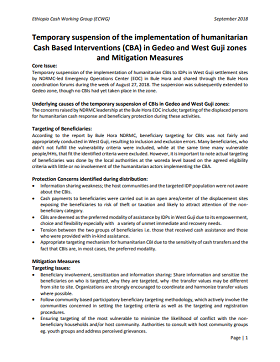
Temporary suspension of the implementation of humanitarian Cash Based Interventions (CBA) in Gedeo and West Guji zones and Mitigation Measures
Report
Temporary suspension of the implementation of humanitarian CBIs to IDPs in West Guji settlement sites by NDRMC-led Emergency Operations Center (EOC) in Bule Hora and shared through the Bule Hora coordination forums during the week of August 27, 2018. The suspension was subsequently extended to Gedeo zone,...

Need and greed: corruption risks, perceptions and prevention in humanitarian assistance
Report
Emergency environments present unique corruption risks for agencies operating within them. Relief is delivered amidst weak or absent rule of law, endemic corruption and immense need. The capacities of governments and humanitarian agencies to assist affected people are stretched to the limit, and agencies...
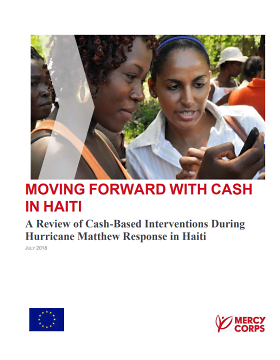
Moving Forward with Cash in Haiti: A Review of Cash-Based Interventions during Hurricane Matthew Response in Haiti
Case Study
Mercy Corps, with funding from European Civil Protection and Humanitarian Aid Operations (ECHO) has conducted an extensive review of lessons learned and contextual data, combined with key informant interviews and workshops to compile, analyse and present core lessons from the Hurricane Matthew cash-based...

The Grand Bargain Cash Meetings: what did we learn, how are we doing, where next?
Blog Post
After cash focal points from Grand Bargain signatory organisations gathered in Rome for the second annual meeting of the Grand Bargain cash workstream, we ask how much progress has been made towards commitments, and what remains to be done.
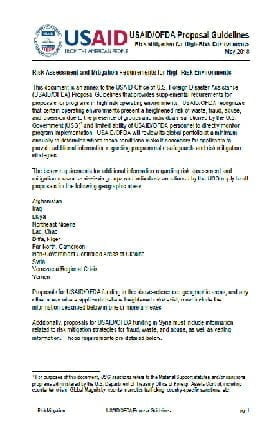
Risk Assessment and Mitigation Requirements for High-Risk Environments
Guidelines and Tools
This document is an annex to the USAID Office of U.S. Foreign Disaster Assistance (USAID/OFDA) Proposal Guidelines that provides supplemental requirements for proposals for programs in high-risk operating environments. USAID/OFDA recognizes that certain operating environments present a heightened risk of...

The Signal Code: Ethical obligations for humanitarian information activities
Guidelines and Tools
Humanitarians today lack sufficient ethical guidance adapted to the realities of humanitarianism in the information age to responsibly navigate the challenges and realities of the digital age. The Signal Code: Ethical Obligations for Humanitarian Information Activities translates and applies the...
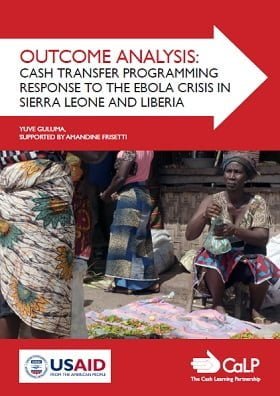
Outcome Analysis: Cash transfer programming response to the Ebola crisis in Sierra Leone and Liberia
Report
The United States Agency for International Development/Food for Peace (USAID/FFP) supported Cash Transfer Programming (CTP) response to the Ebola outbreak in Sierra Leone and Liberia greatly contributed to the recovery of affected communities and households. The CTP response provided a safety net to...

Review of Food for Peace Market-Based Emergency Food Assistance Programs: Democratic Republic of Congo Case Study Report
Report
The Democratic Republic of Congo (DRC) case illustrates the complexity and diversity of contexts within which program design and implementation occurs. It highlights the need for provincial-scale assessments, local market monitoring, and flexibility to pivot to different modalities depending on changing...

A Meeting of Cash Working Group Leads: Sharing Experiences and Learning from Burundi, Ethiopia, Kenya, Madagascar, Tanzania, Somalia, South Sudan, Sudan and Tanzania
Report
Cash Working Group (CWG) leads from nine countries came together to share experiences and learn from one another. This report brings together observations and reflections from the meeting. It provides insights that are likely to be of interest to anyone involved in CWGs or discussions about the...
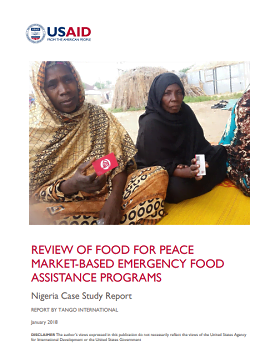
Review of Food for Peace Market-Based Emergency Food Assistance Programs: Nigeria Case Study Report
Case Study
Nigeria is an example of food assistance in a conflict situation in the Sahelian context. The response used information technology to deliver one of the more sophisticated applications of voucher programs. This case is a good example of proactive implementing partner (IP) mechanisms and monitoring systems...
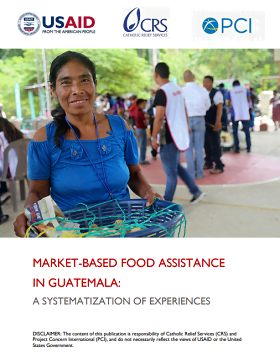
Market-based Food Assistance in Guatemala: A Systematization of Experiences
Guidelines and Tools
In April 2017, at the request of the United States Agency for International Development’s (USAID) Office of Food for Peace (FFP) in Guatemala, Catholic Relief Services (CRS) and Project Concern International (PCI) designed a process to gather and synthesize the experiences of food assistance...



